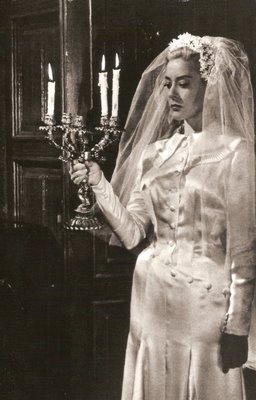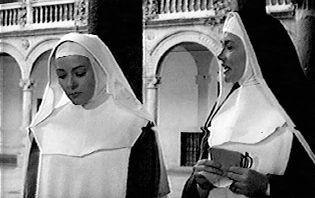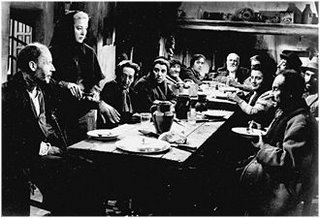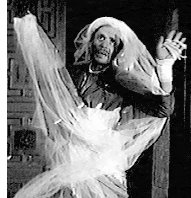 Viridiana (1961)
Viridiana (1961)Director: Luis Buñuel
In his excellent autobiography, My Last Sigh, Luis Buñuel said, "When I was younger, my so-called conscience forbade me to entertain certain images--like fratricide, for instance, or incest. I'd tell myself these were hideous ideas and push them out of my mind. But when I reached the age of 60, I finally understood the perfect innocence of the imagination. It took that long for me to admit that whatever entered my head was my business and mine alone."
Luis Buñuel was 61 when Viridiana premiered, and his tale of sexual perversion and the deflowering of a would-be nun bore out his philosophy to a tee. Generalissimo Francisco Franco, as you might imagine, was not as amused by the imaginative freedom of the over-60 director. Despite Viridiana's selection as Spain's official entry into the Cannes Film Festival, Buñuel was forced to flee to Mexico to escape reprisals by Franco's fascist regime. He remained there the rest of his life, eventually becoming a Mexican citizen. (Ironically, Mexican director Guillermo del Toro, who must have been inspired by Buñuel, took up the cause of examining Franco's Spain in both The Devil's Backbone and Pan's Labyrinth.)
Many of Buñuel's films rail against the hypocrisy and uselessness of the bourgeoisie, the Catholic Church, and the State. While these themes remain fairly constant throughout his genuine oeuvre (as opposed to the dozens of films he made for a buck in Mexico as a journeyman director), some of his films are informed primarily by his surrealist philosophy, and reflect his lifelong fascination with dreams. Viridiana is just such a film.
 Viridiana (Silvia Pinal) is a novice in a cloistered convent. Shortly before she is to take final vows and be locked away from society forever, the Mother Superior suggests that she pay one last visit to her uncle Jaime (Fernando Rey), who paid for her schooling. Viridiana strenuously resists this suggestion, but says that if ordered, she will go. This scene is the first to suggest the dreamlike structure of the film, with a resistant consciousness obeying an order to plunge into the irrational.
Viridiana (Silvia Pinal) is a novice in a cloistered convent. Shortly before she is to take final vows and be locked away from society forever, the Mother Superior suggests that she pay one last visit to her uncle Jaime (Fernando Rey), who paid for her schooling. Viridiana strenuously resists this suggestion, but says that if ordered, she will go. This scene is the first to suggest the dreamlike structure of the film, with a resistant consciousness obeying an order to plunge into the irrational. The scene shifts to an estate, where we see the fancy footwork of a young girl jumping rope under a tree. She is Rita (Teresa Rabal), the sassy daughter of Don Jaime's maid Ramona (Margarita Lozano). When the camera pulls back, we see Don Jaime watching her in delight. He even surprises her with a new jump rope that has real wooden handles. He seems to revel in her innocence and liveliness. His own life has been a lonely one since the death of his wife.
The scene shifts to an estate, where we see the fancy footwork of a young girl jumping rope under a tree. She is Rita (Teresa Rabal), the sassy daughter of Don Jaime's maid Ramona (Margarita Lozano). When the camera pulls back, we see Don Jaime watching her in delight. He even surprises her with a new jump rope that has real wooden handles. He seems to revel in her innocence and liveliness. His own life has been a lonely one since the death of his wife.Viridiana arrives into this sweet scene, but Don Jaime's warm greeting to her is met with a distinct chill. Viridiana doesn't really remember him and still considers him something of a disgrace for fathering a child out of wedlock and abandoning the mother and child, though Don Jaime claims that was the way the woman wanted things. He assures her that his son will be provided for after he has died. He also comments on how much like her late aunt Viridiana is, right down to her walk.
 Viridiana goes to her room to change and rest. The camera moves into Don Jaime's bedroom, where he has a white, high-heeled shoe slipped over the top half of his foot and a veil draped over a dressing screen. He picks up a corset and starts to model it in front of his mirror, quickly tucking it out of sight when the loyal Ramona comes in. He tries to persuade Ramona to speak to Viridiana on his behalf, to ask her to stay on at the house indefinitely. Ramona demurs, suggesting Don Jaime speak to her himself. He moves to her room, but hides out of sight when he sees Viridiana disrobing. In one of Buñuel's patented leg shots, she removes her thick, dark stockings to reveal a very shapely leg.
Viridiana goes to her room to change and rest. The camera moves into Don Jaime's bedroom, where he has a white, high-heeled shoe slipped over the top half of his foot and a veil draped over a dressing screen. He picks up a corset and starts to model it in front of his mirror, quickly tucking it out of sight when the loyal Ramona comes in. He tries to persuade Ramona to speak to Viridiana on his behalf, to ask her to stay on at the house indefinitely. Ramona demurs, suggesting Don Jaime speak to her himself. He moves to her room, but hides out of sight when he sees Viridiana disrobing. In one of Buñuel's patented leg shots, she removes her thick, dark stockings to reveal a very shapely leg.With Ramona's assistance, he eventually persuades Viridiana to do him one last favor--don his dead wife's wedding gown. Apparently, Viridiana was moved by the story of his wife's death in his arms on their wedding night. However, she is repulsed when he proposes marriage to her. This refusal is Ramona's cue to drug Viridiana's tea. Don Jaime lays her out on a bed, intending to rape her. He unbuttons her top and kisses her passionately, but shies from the deed itself. When she comes to in the morning, however, he lies to her and tells her he has ruined her so that she can never return to the convent. Her disgusted rejection of him pushes him to suicide. In a scene of obscene hilarity, Rita is shown playing with the same jump rope Don Jaime used to hang himself.
 Overcome with guilt, Viridiana determines that she cannot return to the convent after all. To carry out her pious mission in the world, she invites local beggars to live in Don Jaime's mansion. She hopes that with religious instruction and useful tasks to perform, they will be uplifted and their souls will be saved. Most submit themselves to her requirements, but as with many religiously based missions, the unfortunates endure the sermons primarily for the food and shelter. In a move that Princess Diana would mirror several decades later, Viridiana touches a "leper" (actually, a syphilis victim) whom the other beggars shun. They agree to suffer his presence, but only if he sleeps in the shed and ties a can to himself so they will know when he is around. When one of the beggars applies himself to painting a religious picture, he asks the lovely Viridiana to pose for him as the Blessed Virgin. When she does so, her vanity becomes all too apparent.
Overcome with guilt, Viridiana determines that she cannot return to the convent after all. To carry out her pious mission in the world, she invites local beggars to live in Don Jaime's mansion. She hopes that with religious instruction and useful tasks to perform, they will be uplifted and their souls will be saved. Most submit themselves to her requirements, but as with many religiously based missions, the unfortunates endure the sermons primarily for the food and shelter. In a move that Princess Diana would mirror several decades later, Viridiana touches a "leper" (actually, a syphilis victim) whom the other beggars shun. They agree to suffer his presence, but only if he sleeps in the shed and ties a can to himself so they will know when he is around. When one of the beggars applies himself to painting a religious picture, he asks the lovely Viridiana to pose for him as the Blessed Virgin. When she does so, her vanity becomes all too apparent.To pick away at this chink in the saintly armor enters Viridiana's bastard cousin Jorge (Francisco Rabal). He unashamedly brings his mistress with him and sets about turning the neglected estate to useful growing and industry. His mistress notices his undue interest in the indifferent Viridiana, and leaves him. He then takes up with Ramona.
 One night, the owners of the estate must leave for town. The beggars become curious about the main house and sneak in. They kill a couple of goats and have a feast, soiling the expensive lace tablecloth, breaking the crystal and china, and making love behind the furniture. In a grotesque parody of Don Jaime's earlier scene, the syphilitic beggar dons the dead wife's corset and her veil and dances an obscene jig. One of the women urges them to assemble for a photograph. The tableau they create is one of the greatest visual gags in cinematic history. When the masters of the house return, the beggars vanish from the house or remove themselves to other rooms. Two of the beggars overpower Jorge and rape Viridiana. With her ideals in tatters and her sexual nature awakened in an archetypal way, Viridiana is both freed and imprisoned by her new, worldly impulses.
One night, the owners of the estate must leave for town. The beggars become curious about the main house and sneak in. They kill a couple of goats and have a feast, soiling the expensive lace tablecloth, breaking the crystal and china, and making love behind the furniture. In a grotesque parody of Don Jaime's earlier scene, the syphilitic beggar dons the dead wife's corset and her veil and dances an obscene jig. One of the women urges them to assemble for a photograph. The tableau they create is one of the greatest visual gags in cinematic history. When the masters of the house return, the beggars vanish from the house or remove themselves to other rooms. Two of the beggars overpower Jorge and rape Viridiana. With her ideals in tatters and her sexual nature awakened in an archetypal way, Viridiana is both freed and imprisoned by her new, worldly impulses.This film dwells in the unconscious as easily as an ant dwells in its underground tunnels. The death of Don Jaime's wife on their wedding night is a shadow cast over the rest of the film. Could the rich man have murdered her so as not to have to consummate the marriage? He certainly has done nothing to find another mate or sexual partner. Perhaps she, too, was drugged, but with an accidental lethal dose. Clearly, Don Jaime's sexual perversion sets the stage for the beggars' orgy and Viridiana's fall and rebirth as a sexual creature with warped tastes. The way the story unfolds reminds me of the progress of a dream. Viridiana's close resemblance to her aunt sounds like the "you were there, but you weren't you" episodes that friends often hear from dreamers. Viridiana's dress-up date with her uncle reveals incestuous impulses in her as well, to come to full flower by the end of the dream.
Luis Buñuel's darkly humorous films stand up extremely well for new audiences because they tap archetypes and primal impulses we all have and find the need to suppress at different times for different reasons. His discovery that "whatever entered my head was my business and mine alone" was a terrific benefit to younger moviegoers looking for that same release. l


1 Comments:
At 11:54 AM, Fox said…
Fox said…
"It took that long for me to admit that whatever entered my head was my business and mine alone."
I love that quote, and you've tickled my growin'-up-Catholic funny bone with this great post.
I've always been attracted to Bunuel b/c of his Catholic observations. And while they can be piercing, they are never - in my opinion - hateful. I feel this way about all of Bunuel's commentary. I think his surrealistic bent gives his attacks an edge of humor that softens the blow.
Plus, I think Bunuel was an artist that was always conflicted with his own convictions. He was never concieted enough to think he had the right answer. This comes across in the interviews he did. Viridiana is the same. She is a warm-hearted idealist, yet the homeless people betray her trust.
Post a Comment
<< Home